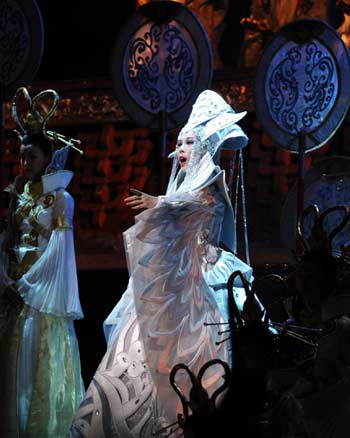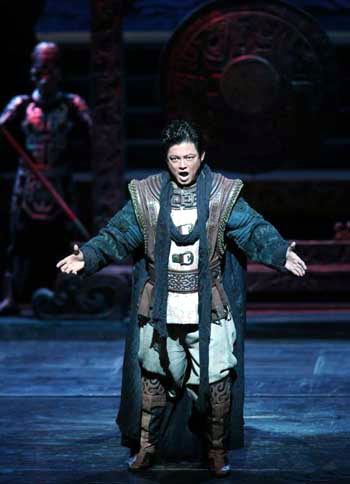By Keen Zhang
China.org.cn columnist
At 6 AM on an ordinary June morning in 2006, Hao Weiya, who at the time was in Italy, received a phone call from Chen Zuohuang, renowned classical musician and art director at the National Center for the Performing Arts (NCPA). The phone call led to Hao becoming the third person in history, and the first Chinese, to attempt to complete Giacomo Puccini's unfinished classic three-act opera Turandot.

The 18-minute addition, with a central aria The First Tear sung by the cold-blooded Princess Turandot, was billed as the most dazzling highlight in this wholly new production with an all-Chinese cast, staged at the NCPA from August 29 to September 2.
I was there on Friday night to witness the much lauded new version of Turandot. I have to say that, for me, Turandot represents a complete and cruel misunderstanding between the West and China. Nothing, from the names of the characters, the location and date of the events portrayed in the story, down to the songs they sing, is remotely Chinese.
It is a weird fable about a kind of "love" that only exists in Western fantasies. Try putting it into a modern context: if the princes of various nations, longing for love, were being serially beheaded by another nation's princess just because they can't solve her riddles, wouldn't this result in a few diplomatic problems? Let us accept, however, that in ancient times it might not. The fairy tale was, in fact, taken from the famous collection of Persian stories called One Thousand and One Days, and it is a legend of Persian origin, with no Chinese connection whatsoever.
However that may be, the story inspired Giacomo Puccini to create an opera masterpiece that remained unfinished when the composer died. Both Franco Alfano and Luciano Berio attempted to complete the maestro's work but their endings were somehow unconvincing and always up for debate and criticism. This new Chinese version, like the others, faces a fundamental problem – how to convince the audience that Prince Calaf really loves the vengeful princess, and how she comes to return his love, all in such a short time, amid the grief caused by the death of Liu, who really loved the prince.
"I believe the true love story of this opera is the story of Liu, the slave girl, who really loves Calaf. The prince's eventual 'love' for the cold-blooded princess Turandot blinded people to the real answer to the question: what does he really love? The political power behind Turandot," said Hong Kong veteran tenor Warren Mok, who starred in two performances of the Chinese version of Turandot, on August 29 and 31. Two other famous Chinese tenors, Wei Song and Dai Yuqiang take over the role of Calaf for in the three other shows.

On August 29, Warren Mok delivered an outstanding performance. His high B at the end of the crown jewel number Nessun dorma, earned him the loudest cheers of the evening. But even though Director Chen Xinyi tried to create a more sympathetic Turandot, portraying her as a naive and pure girl warped by her Nemesis-style ancestor, I remained horrified by her cruel and pathetic nature. I can certainly say I didn't fall in love with her. Nevertheless, the role of Turandot, as performed by soprano Sun Xiuwei, contrasted well with her pale Emperor father on stage.
What impressed me most about the production were the glamorous stage set and fabulous costumes, designed by Gao Guangjian. It was a vast setting with multiple layers, dimensions, perspective and magnificence; the costumes are truly Chinese, full of vigor and one feels genuinely transported back to the glory days of the Tang Dynasty. For the set alone, there is no doubt that the vivid and Chinese-flavored Turandot will come to be seen as the NCPA's latest and greatest blockbuster.
(China.org.cn September 2, 2008)